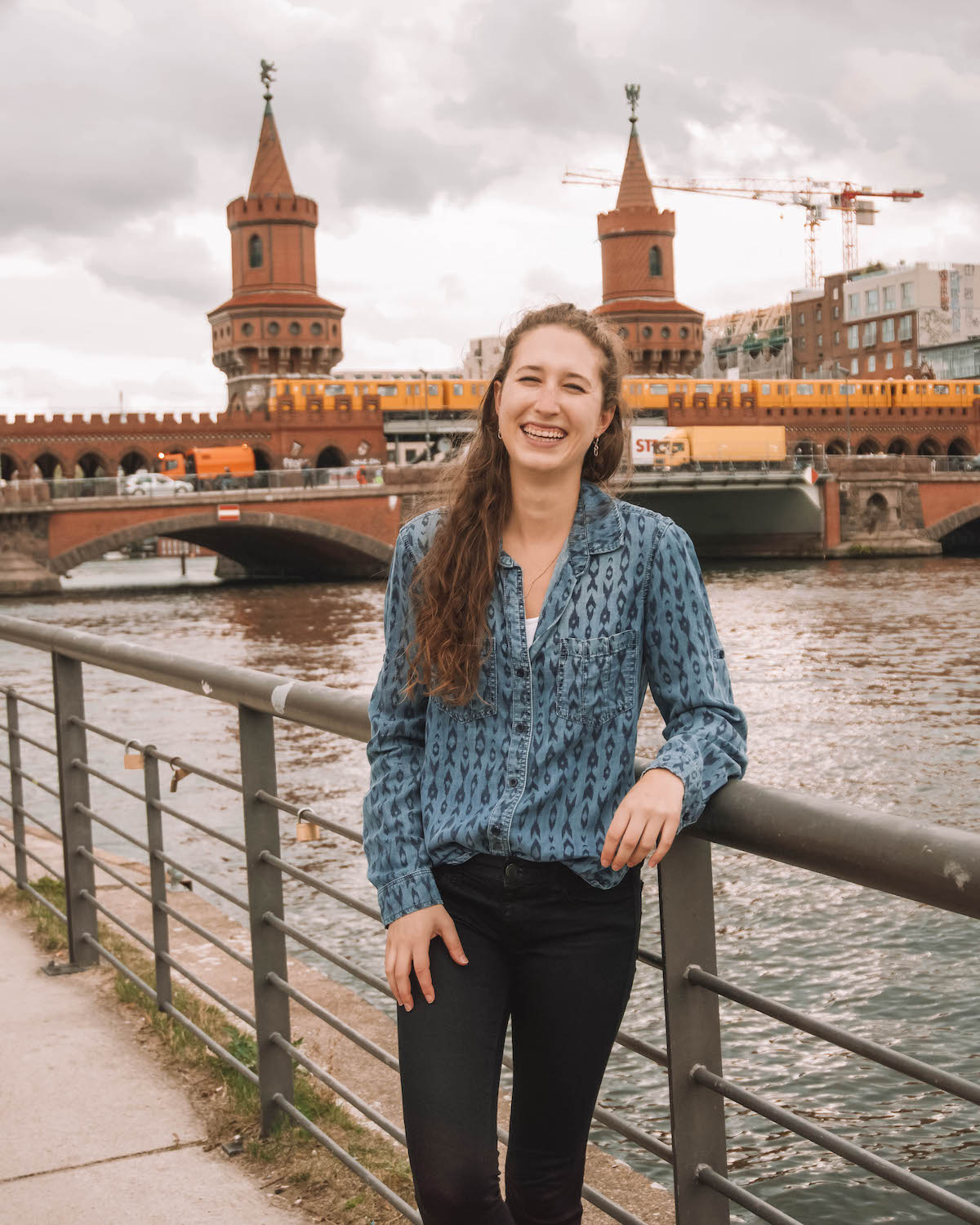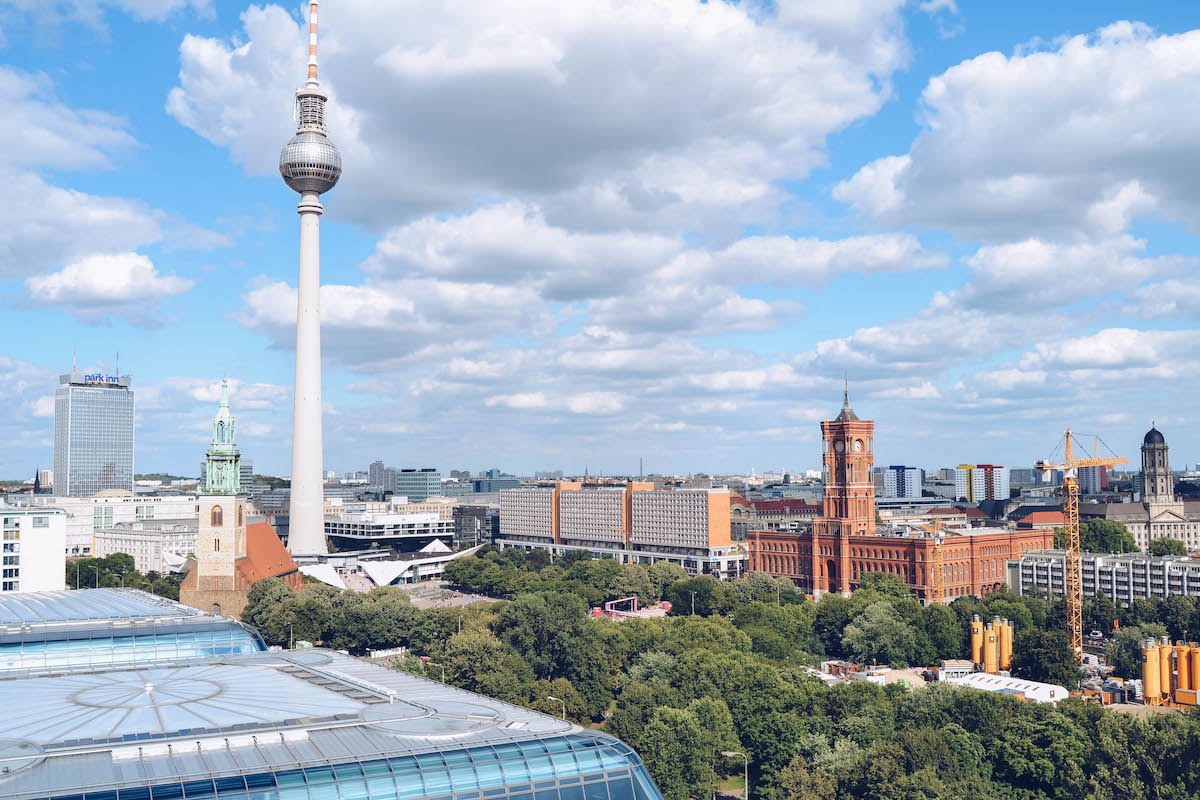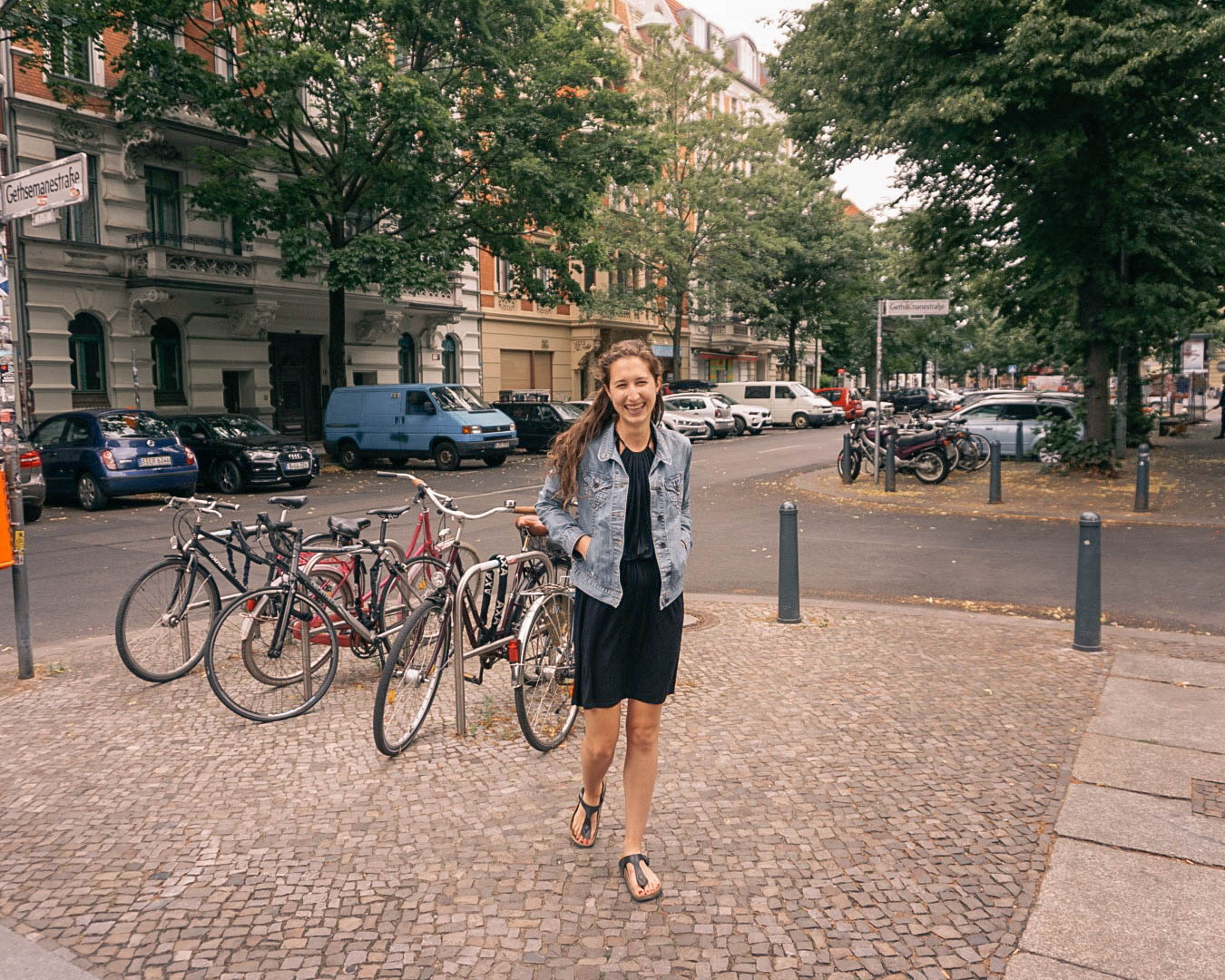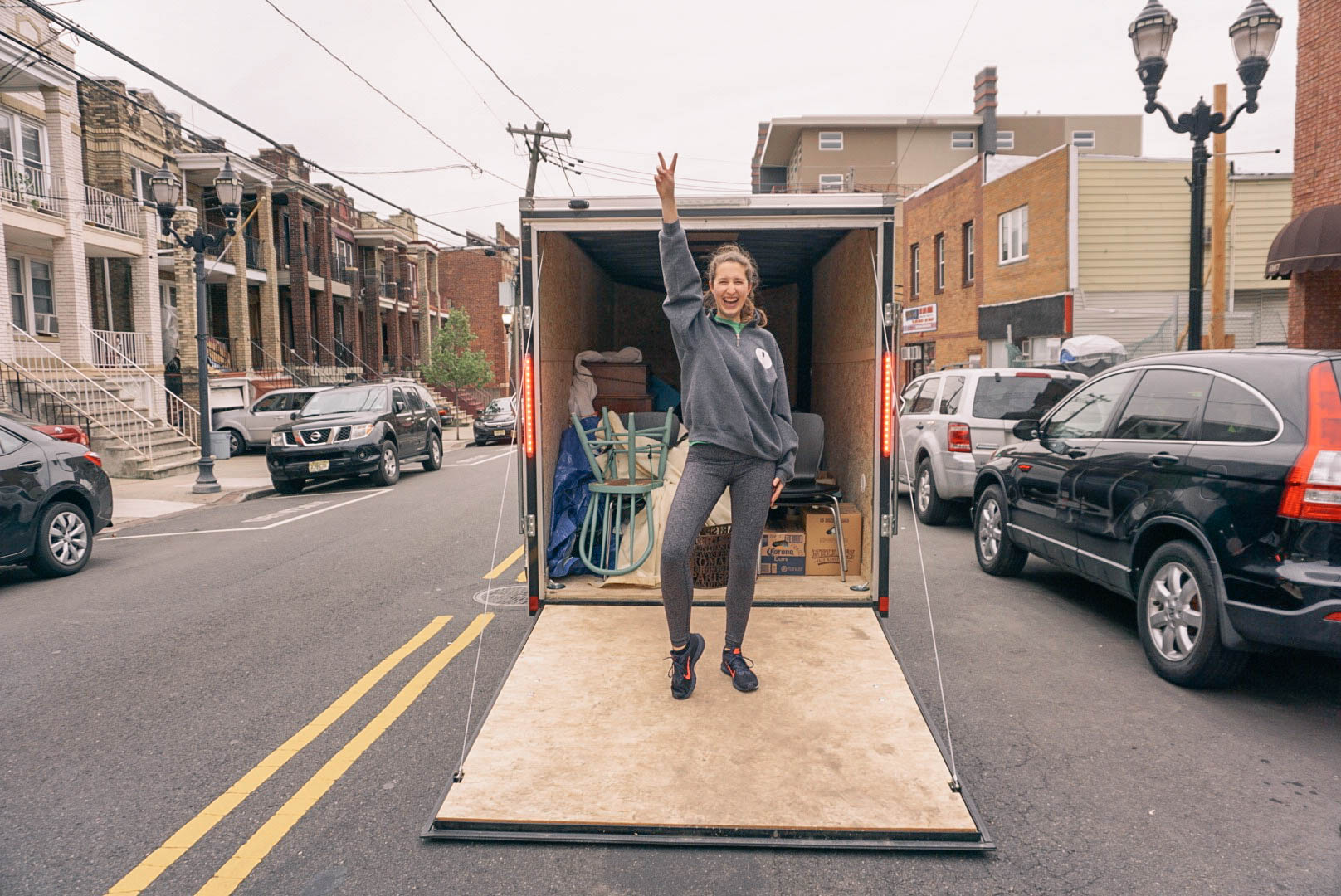Interested in moving to Germany? Here’s everything you should know about the Berlin freelance visa, plus a few tips on how to move to Germany in a smart, stress-free manner.
Heads up! This post was written in 2020 and the requirements for the freelancer’s visa may have changed since then. I’ve not yet had time to update this guide, so until I do, please note that the info provided is likely out of date. –Claire, AKA the “Tall Girl” behind this blog

If you’ve been following me since last year, you already know I moved from NYC to Berlin, Germany in May 2019. Since making the big move, the number one question I’ve been asked from friends, families, and readers has been “How did you manage to move to Germany as a freelancer?” I’ve written a number of posts about my move here on Tall Girl Big World, but I can easily understand how — even after reading all those posts — people are still confused about the logistics of my transatlantic move. In all honesty, I had difficulty explaining the visa process to my family even while I was going through it. It’s just one of those life events you have to experience yourself to fully comprehend, but I’m going to do my best to explain the entire visa process to you today in hopes of helping any of you who are wanting to move to Berlin as well.
Before jumping into the visa application process and how my move to Germany panned out, I wanted to briefly explain what the heck I do. In short, I’m a freelance writer and SEO specialist. I primarily work with food bloggers to make their posts search-friendly, which typically involves lots of SEO keyword research and ghost writing. Pretty neat, huh? At the time I’m writing this post, all of my clients are still based in the US, but I’m actively pitching prospective clients in Germany since I’m required to work in-country to keep my visa.
Moving to Germany isn’t easy, but it’s certainly not impossible. As long as you meet all the requirements for the Berlin freelance visa, you should be given a visa.
Disclaimer: This is NOT legal advice. This is just my experience with obtaining a freelance visa in Germany. There’s no guarantee your visa application process will pan out the same as mine. When in doubt, contact an immigration lawyer if you’re in need of assistance.
Who Qualifies for a Freelancer’s Visa?

Before making the move to Germany, triple check that you actually qualify as a freelancer. There are two very similar visas available in Berlin, a self-employed residence permit and a freelance residence permit. Read the fine print on both types of visas to figure out which you qualify for. As a writer, I qualified as a freelancer since I write for a number of publications. But depending on your job, the number and types of clients you have, etc. you may or may not be considered a freelancer in the eyes of the German government.
If you have any doubt about your qualifications for this particular type of visa, consult an immigration professional of some kind who’s based in Berlin. It’s very important that you fit within the exact parameters outlined by the German government when applying for the Berlin freelance visa, otherwise you might not be allowed to stay in the country. As a US citizen, I was allowed to remain in Germany for 90 days before receiving my visa.
What’s Needed for a Freelancer’s Visa

You’ll need to fill out and print LOTS of paperwork when applying for the Berlin freelance visa. Below is a checklist of everything you need to bring with you (all of this is explicitly outlined on the Berlin government’s website).
- Valid passport
- 1 biometric photo
- Visa application form (called the “Antrag auf Erteilung eines Aufenthaltstitels”)
- Financing plan
- Revenue forecast
- Letters of intent (from prospective German clients)
- Copies of current freelance contracts
- Curriculum vitae
- Professional permit (only if required for the type of work you do)
- Proof of German health insurance
- Lease or proof of home ownership
- Proof of pension plan (if older than 45)
- Proof of main residence in Berlin (i.e. an Anmeldung)
You will also have to pay a fee if you acquire a freelance visa (I paid 56 Euros, but it may vary depending on how long your visa is good for, etc.)
Additional unofficially required documents I brought along with me just to be safe included:
- Letters of recommendation from past clients
- Bank statements from the past 3 months (from both my US and German accounts)
- Samples of my recent work (in my case, the last few articles I’d had published)
Breaking Down the Requirements for the Berlin Freelance Visa

You may be looking at the list above thinking, how am I ever going to get all this done? Remember: you have 90 days to make it happen. You’ll definitely feel the pressure, but if you make a game plan for yourself before moving to Germany everything should turn out okay. There are just a few key things I want to address about the Berlin freelance visa application materials:
Choosing Your Job Title — When filling out the application form itself, be very careful about picking a job title for yourself. Once you’ve obtained the visa, you’re legally bound to only take on work that suits your job title. For example, on my visa it states that I’m a writer. This means I can write articles for newspapers, write social media copy, write a company’s monthly newsletter, etc. I’m not allowed to take on any freelance job that comes my way, it must be some form of writing. I believe I can go back to the Ausländerbehöde and ask to have another job title added to my visa, but I haven’t looked extensively into that yet.
Acquiring Letters of Intent — Your letters of intent must come from prospective clients based in Germany. Before moving to Germany, I built up my US clientele under the assumption that I could simply show my US contracts in place of the letters of intent. Wrong! You need to begin networking with German companies as soon as you land in Berlin so you can obtain those letters of recommendation. Two letters of recommendation are the minimum, but the more you can obtain, the better. I recommend reaching out to people on LinkedIn and asking them out to coffee to connect / explain your situation. That really helped me out!
Formatting Your Curriculum Vitae — Note that Germans format their CVs and resumes different than we’re taught in the US. I’m not sure if the format of your CV really matters in the visa application process, but I don’t think it’d hurt to do a quick Google search to confirm that your CV is in the correct German format.
Signing Up for German Health Insurance — Without a visa, you can’t sign up for public healthcare in Germany. Instead, you’ll need to go through a private health insurance provider. I currently use Mawitsa’s Expatcare, which is essentially glorified travel insurance. I’ll be switching to the public healthcare system soon but Mawitsa’s plan was acceptable for my visa application. Please note that you can not apply for a freelance visa in Germany with regular travel insurance! You need legit health insurance.
Proving That Your Main Residence is in Berlin — On the Berlin government website, it says you can provide them with a copy of your lease and a note from your landlord stating you actually live where you say you do. But to be 100% safe, I moved into an apartment that I knew I’d be able to register my address at. When you register your address, you receive a document called an Anmeldung. To get an Anmeldung, you have to make an appointment at a Bürgeramt in Berlin (you can go to any Bürgeramt that you want). Note that you’re supposed to register your address within the first 2 weeks of moving to your apartment.
Useful Resources to Utilize

Although the visa application process can be stressful and overwhelming at times, remember that you’re not the first person who’s gone through all of this. There are so many freelancers in Berlin, and over the years entire companies have been built around helping foreigners relocate to Berlin. Below are a few of the resources that proved extremely useful during my move to Berlin and the subsequent freelance visa application process:
Expath — If there’s one thing you take away from this post, please let it be to set up an appointment with Expath as soon as you land in Berlin. Expath is an agency that specializes in helping expats navigate life in Germany. You can set up a consultation to discuss all things visa-related, and they also offer German classes as well. I had an appointment with Expath my first week in Berlin and it was so useful! They went over the Berlin freelance visa requirements with me and gave me lots of useful tips on filling out the application form, finding an apartment, obtaining an Anmeldung, etc. Even if you think you fully understand the visa process, you should still make an appointment with them. It never hurts to be over prepared for something like this!
Roomys — The hardest part of the moving process was finding an apartment that I’d be able to get an Anmeldung for (many people sublet individual rooms in their apartments for only a few months, but you can’t obtain an Anmeldung through a sublet). I wound up finding a fully furnished apartment through Roomys. The apartment was more expensive since I went through a website that specializes in relocating expats and the apartment was fully furnished, but I wasn’t looking for a long-term rental contract, just someplace to rest my head until I got my visa. Note that the Roomys website is currently under construction — hopefully they’re still operating because it was a really handy service to use.
Useful Facebook Groups — When you get to Berlin, I suggest networking your little tushy off. The Facebook groups I found helpful for asking questions and meeting new people were: Female Freelancers in Berlin, Berlin Freelancers, and Creative Ladies Berlin.
LinkedIn — For me, the toughest aspect of the Berlin freelance visa application process was figuring out how to get letters of intent from German clients before I had a visa (because without a visa, I couldn’t actually work in Germany. It’s a bit of a catch 22). I wound up reaching out to a dozen or so female freelancers on LinkedIn asking them out to coffee so I could hear more about their move to Berlin and get their recommendations on obtaining letters of rec. It’s so easy to find local freelancers via LinkedIn, and I feel like reaching out to someone on there seems more legit and professional than, say, DMing them on Instagram or Facebook.
What to Expect at Your Visa Appointment

Again, everyone’s visa appointment experience will differ, but my appointment went quite smoothly. I booked the earliest time slot at the Ausländerbehöde and arrived 30 minutes early because I was a Nervous Nelly. When I made the appointment online, I was emailed a PDF with my appointment info and case number. I brought that print-out with me and sat in the waiting room until my number flashed on the TV screen at the front of the room.
I walked back to the room I was directed to and sat down in front of a single government official (I thought it was going to be a panel for some reason, so I figured I’d mention it’s just one person). He asked me no questions initially, just asked for me to hand him my forms in a particular order. After being handed the forms, he dismissed me and said to return to the waiting room.
Sweating bullets, I sat in the waiting room for a good 20 to 30 minutes while he reviewed everything. My case number finally flashed up on the TV screen again and I went back to the visa room. The government official slid over my passport, complete with a shiny new visa sticker, then directed me to the machines downstairs where I could pay for the visa.
All I had to do then was pack up my things, pay for the visa (in cash, I should add), and head home. The entire process took less than an hour and it was a fairly chill process all things considered.
One thing to note about the visa appointment is that the government official reviewing your application is legally required to speak in German to you, so if you don’t speak any German I highly recommend hiring an interpreter. Even though I speak German, I hired an interpreter from Expath to accompany me to my appointment since I was worried I’d be asked a lot of questions I couldn’t answer in German. I wound up not needing the interpreter as I understood the few questions the official asked me, but I’m glad I had someone beside me during the interview anyways. You just never know how these things are going to pan out!
Tips for Moving to Berlin & Getting a Visa

Okay, this blog post is almost the length of a novella so I’ll do my best to keep the rest of my tips short and sweet. Below are some general tips I found super useful during the visa process and my entire move overall:
- When booking your appointment at the Bürgeramt to register your address, note that you can go to any Bürgeramt in Berlin. It says online that you have to register your address at your local Bürgeramt, but it honestly doesn’t matter. Just book an appointment at any Bürgeramt with availability, bring all the documents listed online, and be prepared to wait!
- Appointments at the Ausländerbehöde can be tough to come by. As soon as you land in Berlin, you should be on your computer every morning at 8am on the dot to see what appointments are available near the end of your 90 days in Germany. They release available appointment times at 8am, which is why you need to be prepped and ready to book one ASAP.
- Your appointment at the Ausländerbehöde must fall within your first 90 days in Germany. I’ve read conflicting information about this — some say that as long as you have proof that you booked the appointment within 90 days of arriving in Germany, that’s fine. However, Expath told me during my visa consultation that the appointment itself needed to take place within 90 days of my arrival in Germany so that’s what I did.
- Don’t have friends in Berlin yet? Don’t fret, it’s easy to make friends here, even if you don’t speak German. If you’re a woman, I highly recommend using Bumble BFF to find friends in the area. That’s how I met all of my friends here!
Read more: How to Make Friends in a New City
My Personal Timeline: Moving to Berlin & Getting My Visa

To wrap things up, I wanted to briefly go over my personal timeline from my move to Germany. There’s no “right way” to move to Berlin, but I wanted to share how events unfolded for me so you have a better idea of how long things may take after arriving in Germany. I also want to share my moving timeline because when I came to Berlin I had zero idea of whether or not I was doing things at a “normal” rate — I still don’t know if I checked off my visa and moving to-do’s as other people would have done, but I hope that by sharing my (condensed) journey with you all it gives you some sort of insight into how this whole process went down. If you want the full play-by-play of my move to Berlin, I recommend reading through my expat diaries here.
End of May 2019 — Flew from NYC to Hamburg, Germany. Spent the whole week visiting a good friend and recovering from jet lag.
June 2019 — Took the train to Berlin the first week of June, then spent the entire month hopping from AirBNB to AirBNB to get a better idea of where I wanted to live. This was a more stressful time than I anticipated since I had to pack up and haul around three suitcases the entire month. I also contacted some of my previous clients asking for letters of rec to include in my visa application.
July 2019 — Found a short-term place to live and got my Anmeldung for the new address. I also signed up for health insurance (Mawitsa) and opened a German bank account (N26).
August 2019 — Spent the week before my visa appointment organizing all my application materials, filled out the forms I still needed to complete, etc. My visa appointment was August 19 and I walked out of the appointment with a visa that’s valid for two years!
Have Any Questions?
I sincerely hope this novella-length blog post proves useful for those of you who are thinking about making the big move yourself! As I said at the start of this post, this is in no way legal advice or anything like that. This is simply my personal experience applying for and obtaining the Berlin freelance visa.
If you have questions about the process, I’m happy to help in whatever way I can. However, I highly recommend contacting Expath or a German lawyer who specializes in immigration for any niche questions you may have.
Lastly, please note that since writing this post I’ve renewed my freelancer’s visa and have written a detailed guide about the experience here.

Comments & Reviews
Hello! I am a freelance writer and editor attempting to relocate to Berlin in April next year. This was super insightful – thank you. I do have one question, though. You state, “At the time I’m writing this post, all of my clients are still based in the US, but I’m actively pitching prospective clients in Germany since I’m required to work in-country to keep my visa.”
Later you say you need letters of intent from prospective German clients in order to obtain the visa. So, you received the visa without having any German clients at that time?
Thank you!
Hi Rowena! Yes, it’s a bit of a Catch-22 situation. So, letters of intent are essentially non-binding contracts that a German company writes for you saying that they’d like to work with you (including when and how much they anticipate paying you). So I had to find German companies or self-employed persons who were POTENTIALLY willing to work with me, provided I got a visa. But at the time of applying for the visa they were not actual clients because we hadn’t yet started our working relationship. It’s a very confusing requirement, let me know if that makes sense or if you have additional questions!
Hi Claire,
That makes total sense. Thanks for taking the time to respond.
All the best,
Rowena
Hi Claire, thanks for this post! Fantastic info, and I’m happy to see the result. One question: I know that visas can sometimes take months to process, and you can’t freelance for German companies in this period. But any idea if you can keep up freelancing work with prior U.S. clients (aka freelance roles outside Germany)? Big thanks for any help
Ask an immigration lawyer to be sure, but yes, I continued working with my US-based clients while I was living in Germany prior to receiving my visa. Without an income, you can’t support yourself after all! And that’s what the German government wants to make sure of. Best of luck with the visa application process!
Thank you, Claire!
Hello!
Thank you so much for this amazing article. It is really helpful. I’m also freelance writer, and I’m planning to move to Berlin. Can I ask you some tips for finding German clients for freelance writing? How did you find it? Does it have to be a company? Any tips will be helpful.
Thank you so much!
Hi Naz! How exciting that you’ll be moving to Berlin soon! I highly recommend reaching out to freelance writers and editors in Berlin (I used LinkedIn and Facebook groups to do this) and asking to buy them a coffee so you can discuss the freelance scene in the city. I spent my first 4 to 8 weeks in Berlin meeting up with 1 or two freelancers per week, explaining my situation to them, and asking for their advice NOT for work outright. But those people kept me in mind and were incredibly helpful in directing me to companies they knew were hiring freelance writers, friends they had in Berlin who owned their own businesses, etc. I will say it’s very difficult to get established companies to write a letter of intent for you since it’s not a binding contract and they’re unwilling to go out on a limb for a freelance writer they’ve never worked with before. So that’s why I recommend networking with other freelancers in the area first because they’ll be able to help you ease into the market more easily. Best of luck, moving to Berlin can feel overwhelming at times but it’s the best decision I’ve ever made!!